business-services

July 09,2025 • 3 min read
Wearable Technology: Redefining the Way We Live and Interact

In an increasingly connected world, wearable technology stands out as one of the most exciting innovations transforming how we live, work, stay healthy, and even entertain ourselves. Whether it's the smartwatch on your wrist, the fitness tracker counting your steps, or smart glasses giving real-time information overlays, wearable devices are bridging the gap between digital data and the human experience.
What Is Wearable Technology?
Wearable technology refers to electronic devices worn on the body—either as accessories, embedded in clothing, or directly attached to the skin—that monitor, analyze, and transmit data. These devices often include sensors, connectivity (Wi-Fi, Bluetooth), and processors, allowing them to interact with users and other systems in real time.
The ultimate goal of wearable technology is convenience and continuous connectivity, empowering users with insights that lead to healthier, more efficient, and more informed lifestyles.
Popular Types of Wearable Devices
1. Smartwatches
2. Fitness Trackers
3. Smart Glasses
4. Wearable Medical Devices
5. Smart Clothing
Applications Across Industries
Healthcare
Healthcare is one of the biggest beneficiaries of wearable technology. Devices enable remote patient monitoring, early disease detection, and chronic care management. Patients with diabetes, heart disease, or respiratory issues can track vital signs in real-time, reducing emergency hospital visits.
Fitness and Lifestyle
Fitness bands and smartwatches help millions maintain healthier lifestyles. These devices offer custom workout plans, sleep quality analysis, and even mental health indicators, like stress tracking.
Workplace and Enterprise
In industries such as manufacturing, construction, and logistics, wearables like smart helmets and AR headsets improve worker safety, streamline training, and enhance productivity through real-time data visualization.
Fashion and Entertainment
Fashion designers are experimenting with wearable tech as artistic expression. Smart jewelry and connected garments fuse style with function. In entertainment, VR headsets provide immersive gaming and virtual event experiences.
Education and Training
Smart glasses and VR-based headsets are transforming the classroom and training ground. For example, VR surgery simulations help medical students practice in realistic environments, while remote AR instruction supports field engineers.
Recent Trends in Wearable Tech
-
AI Integration: Artificial intelligence is powering more adaptive and personalized wearable experiences, such as predicting health anomalies or customizing workouts.
-
Emotion and Stress Detection: Wearables now track emotional states and offer suggestions for mindfulness or breathing exercises.
-
Flexible and Stretchable Electronics: Future wearables will be more comfortable, with electronics embedded in soft fabrics or stretchable materials.
-
Wearables for Seniors: Devices designed specifically for the elderly offer fall detection, medication reminders, and emergency assistance.
-
Self-charging Wearables: Devices that harness solar energy or body heat for power are emerging, reducing reliance on manual charging.
The Future of Wearable Technology
As technology becomes more seamless and human-centric, the next generation of wearables will go beyond the wrist and face. The integration of Internet of Things (IoT), AI, and 5G will make wearables smarter and faster.
We may soon see:
-
Implantable micro-devices for real-time health analysis.
-
Smart tattoos that read vital signs.
-
Neural wearables that interpret brain activity for gaming, mental health, or controlling smart devices.
-
Wearables in Smart Cities, where your environment responds to your biometric signals.
Wantstats is a premium platform that provides unparalleled data and statistics across 30000 markets and 100 countries in both B2B and B2C segments. Designed to fit the needs of industry stakeholders, associations, libraries, students and many more looking for statistics.
Tejas Amale Details
User Profile
- Full name
- Tejas Amale
- Email address
- amaletejas47@gmail.com
- Join Date
- 2025-07-09
- State
- City
- Pincode
- Address
- Follow us on Facebook
- Follow us on Twitter
- Website Name
- Bio